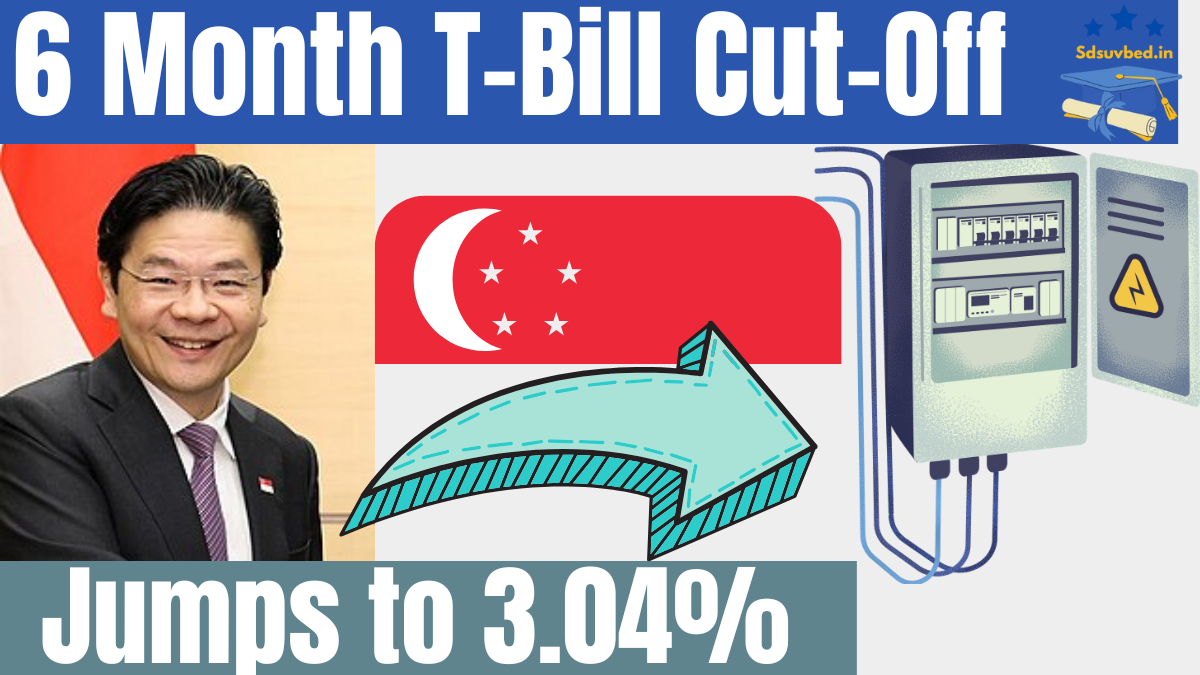Singapore’s latest six-month Treasury bill (T-bill) auction saw its cut-off yield rise to 3.04% on January 28, 2025, up from 2.99% in the previous auction on January 16, 2025.
This increase reflects changing investor sentiment amid shifting global economic conditions and expectations surrounding the US Federal Reserve’s interest rate policies.
Despite the higher yield, overall demand for the T-bill fell, with the bid-to-cover ratio dropping from 2.55 in the previous auction to 2.13 in this auction.
Let’s take a closer look at what’s driving this shift and what it means for investors.

How Did Demand for Singapore’s T-Bill Change?
Although the cut-off yield increased, demand for the latest auction declined compared to the previous auction:
| Auction Date | Cut-Off Yield | Total Applications | Total Offer Amount | Bid-to-Cover Ratio |
|---|---|---|---|---|
| January 16, 2025 | 2.99% | S$18.4 billion | S$7.2 billion | 2.55 |
| January 28, 2025 | 3.04% | S$15.3 billion | S$7.2 billion | 2.13 |
Key Observations:
- Lower demand: The total number of applications dropped by S$3.1 billion.
- Higher yield: The median yield rose to 2.97% (from 2.88%), while the average yield increased to 2.69% (from 2.52%).
- Non-competitive bids remained stable, with S$2.3 billion allotted.
Why Are Singapore’s T-Bill Yields Increasing?
Several factors are influencing the rising T-bill yields:
1. US Federal Reserve’s Interest Rate Policy
- Analysts expect the US Federal Reserve to keep interest rates unchanged at its upcoming Federal Open Market Committee (FOMC) meeting.
- Markets are pricing in 44 basis points of rate cuts later in 2025, but Fed Chair Jerome Powell is expected to maintain a cautious stance.
- A strong US economy is likely to delay aggressive rate cuts, impacting global bond yields, including Singapore’s.
2. Shifting Investor Sentiment
- Investors are growing cautious about downside risks in the economy.
- US dollar yields may trend lower, leading investors to seek better returns in short-term government securities like T-bills.
- If economic sectors like artificial intelligence (AI) slow down, further rate cuts may be justified, impacting bond yields globally.
3. Singapore’s Growing Government Securities Issuance
- Singapore plans to issue up to another S$450 billion in government securities.
- The total issuance limit was raised to S$1.515 trillion (from S$1.065 trillion) following a parliamentary motion in November 2024.
- Increased issuance can lead to higher yields to attract investors.
What Does This Mean for Investors?
1. Higher Returns on Short-Term Investments
Investors holding six-month T-bills will benefit from the higher 3.04% yield compared to previous auctions.
2. More Competition for Future Issuances
- As Singapore expands its government bond issuance, future auctions may see fluctuating demand and yields.
- Investors may shift towards other securities if global interest rate trends change.
3. Potential Interest Rate Cuts in 2025
- If the US Federal Reserve begins cutting rates later this year, Singapore’s T-bill yields may fall in response.
- Investors looking for higher yields may need to act now before yields decline.
READ MORE: How US Fed Interest Rates Influence Singapore Mortgage Rates in 2025 – What Homeowners Must Know
Frequently Asked Questions
What is the current yield for Singapore’s six-month T-bill?
The latest cut-off yield is 3.04%, up from 2.99% in the previous auction.
Why did demand for the latest T-bill auction fall?
The bid-to-cover ratio dropped due to cautious investor sentiment, changing interest rate expectations, and increased supply of government securities.
How does the US Federal Reserve impact Singapore’s T-bill yields?
If the Fed delays rate cuts, bond yields may remain high. However, if rate cuts occur, T-bill yields could decline.
How much did Singapore’s government increase its bond issuance limit?
Singapore raised its government securities issuance limit to S$1.515 trillion, an increase of S$450 billion from the previous limit.
Should investors buy T-bills now?
Investors looking for short-term safe returns may find the current 3.04% yield attractive, especially if future yields decline with rate cuts.
Will Singapore’s T-bill yields continue to rise?
Yields will depend on global economic conditions, Federal Reserve policies, and Singapore’s government bond issuance strategy.
Where can I check the latest T-bill auction results?
Auction results are published on the Monetary Authority of Singapore (MAS) website and financial news platforms.
Click here to know more.
A passionate content writer specializing in creating engaging, SEO-optimized content. With expertise in blogs, web copy, and storytelling, I craft words that connect with audiences and deliver results.
